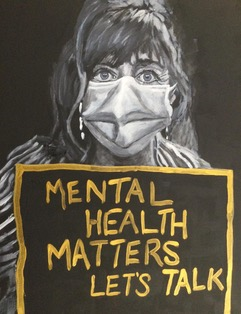Life can change in a day. When the COVID-19 pandemic struck a year ago, the Mood Disorders inpatient psychiatric unit at Royal Jubilee Hospital (RJH), where I work as an Occupational Therapist, changed overnight. Suddenly, how we supported our patients shifted to align with the new demands of COVID-19, ensuring that the physical health and safety of patient and staff were a priority. It was and still is a challenging time.
Our unit became the admissions unit for all adult acute psychiatric admissions in Victoria, serving the south Island and gulf islands. People with mental health concerns—or who are in crisis—often come to us in their most vulnerable state. When you add in all of the unknowns of a global pandemic—not being able to see your loved ones, or leave your room, or engage in any therapeutic activities during your stay—it makes it hard. Really hard. Our patients are experts of their own journeys, and they need someone to listen to their story. COVID-19 changed so much for us, and for them.
Painting of Sarah Smith created by artist Shannon Holms as part of her B.C. Healthcare Heroes portrait series.
Now, a year after the pandemic began, my colleagues and I are seeing the seams of all community members’ well-being and mental health unravelling at an exponential speed—especially in acute inpatient services. So much of our COVID-19 response as a community has focused on physical wellbeing. The mental health side of health care often gets overlooked.
But right now, the Victoria Hospitals Foundation is shining a light on us, on our services, and on our patients. Through their campaign, Equipped to Heal, they are sharing our stories and allowing our community to have a direct impact on mental health resources, care, and innovation at RJH. And we will gratefully take all the help we can get.
Inpatient acute psychiatric services, and outpatient Mental Health and Substance Use services (MHSU) play a vital role in supporting our community’s wellbeing. Our aim is to collaboratively provide individuals, family members, and the community adequate treatment, recovery and wellness education to support successful patient outcomes. And the demand for MHSU services for all populations is greater than ever.
My colleagues and I celebrated the opening of a new Psychiatric Sub-Acute unit this past March at the Eric Martin Pavilion on the RJH campus. The unit establishes a new and unique level of care for patients. On the unit, my colleagues and I work in partnership with patients to educate, and build their wellness toolkit and support their personal goals of where they want to go, and what they want to do. Together, patients and staff create a detailed map, guiding patients on a successful path to transition back into the community once more.
As an Occupational Therapist, that really is my goal—to help those I work with return to activities of daily life that are meaningful to them. It’s what allows them to gain a sense of purpose, heal and thrive.
My MHSU colleagues have been the unseen frontline heroes this past year. These dynamic and committed professionals from many different disciplines deserve recognition. But more than recognition, they deserve our support in their incredibly important work.
Mental health matters. Please consider equipping MHSU teams with the tools we need to take care of those who need it most.
Learn more and support MHSU in our hospitals today.
—Sarah A. Smith, BScOT







